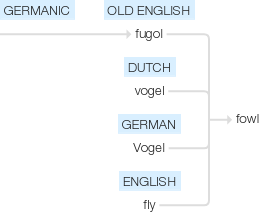Fowl
Old English fugol ‘bird’, of Germanic origin; related to Dutch vogel and German Vogel, also to fly1.
wiktionary
From Middle English foul, foghel, fowel, fowele, from Old English fugol(“bird”), from Proto-Germanic *fuglaz, dissimilated variant of *fluglaz (compare Old English flugol ‘fleeing’, Mercian fluglas heofun ‘birds of the air’), [1] from *fleuganą(“to fly”). Cognate with West Frisian fûgel, Low German Vagel, Dutch vogel, German Vogel, Swedish fågel, Danish and Norwegian fugl. Doublet of voël. More at fly.
fowl ( comparative fowler, superlative fowlest)
etymonline
fowl (n.)
Old English fugel "bird, feathered vertebrate," from Proto-Germanic *fuglaz, the general Germanic word for "bird" (source also of Old Saxon fugal, Old Frisian fugel, Old Norse fugl, Middle Dutch voghel, Dutch vogel, German vogel, Gothic fugls "a fowl, a bird"), perhaps a dissimilation of a word meaning literally "flyer," from PIE *pleuk-, from root *pleu- "to flow."
Displaced in its original sense by bird (n.); narrower sense of "barnyard hen or rooster" (the main modern meaning) is first recorded 1570s; in U.S. this was extended to domestic ducks and geese.
fowl (v.)
Old English fuglian "to catch birds," from the source of fowl (n.). Related: Fowled; fowling. Fowling-piece "gun used for shooting wildfowl" is from 1590s.
